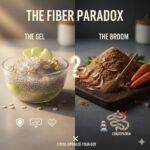Does it seem more difficult to eat healthy when traveling, or away from your routine at home? Here are some easy practical tips and tricks to stay on track!
I made the video above to help people with nutrition habits and choices when traveling, but it also addresses struggles while staying home, like how important hydration is, and strategies for going out or to parties where there will be food that might not be the healthiest.
Below are some additional travel nutrition tips I added after traveling myself recently and observing what I do naturally, so consider that a bonus!
1.) Watch out for “vacation mode.” When people go on vacation or travel on business, they often (unconsciously) switch into another mental mode and eat differently without even realizing it. This is because they are taken away from the usual healthy routines and patterns they established at home.
Healthy eaters all have their favorite foods in the fridge, familiar kitchen patterns, local healthy restaurants with the usual orders, etc. All that goes away when traveling, and then the brain can be left floundering not knowing what to do. Then hunger hits, or stress (good or bad), and poor choices are easy to make.
The solution is to stop, take a breath, call out vacation mode, talk to your brain, and “remember your why,” which is the reason you want to be healthy and fit. Then come up with a plan and consciously make good choices. If you are hungry or even stressed at the moment, you won’t starve to death if you don’t eat something right away, so take a pause and find something healthy that would fit in with your normal parameters from back home.
2.) Eat the most nutritious foods first. “Vacation mode” or “Travel mode” tempts us to drink more alcohol and eat more indulgences than at home because we are in a different mode. We make excuses for treats and less nutrient-dense foods when we are in that mode and then the 10 lbs. it took us 3 months to lose are gained back in a week, leaving us feeling like failures, creating regrets, and sometimes wanting to give up altogether.
So when you are tempted to eat foods outside your normal healthy range, make a rule that you will wait 21 minutes after you have eaten a bunch of nutritious veggies and protein. Then see if you still want that drink and indulgent food. If you do, ask yourself if it’s worth going backward and losing some hard-earned progress. This technique is also assuming you are well hydrated to start with, which, as mentioned in the video above is massively important when traveling – and at home of course – but traveling often kicks people out of hydration mode too, so it’s worth mentioning again.
3.) Take a pass on the freebies. The resort might offer free drinks. There might be free snacks in the hotel room or chocolates on the pillows. All those really add up over time because your brain doesn’t count or track them like other food or meals. It can even block them out and make you forget it ever happened!
When flying, the flight attendants may come by with free snacks. Those are NEVER a good idea, even if it seems “healthy.” Bring your own healthy snacks on the plane instead and eat those when you are hungry. My two favs are jerky and hard-boiled eggs with pink salt. And of course, hydrating even more than usual because the air up there is very dry, so you need extra water. I usually buy some spring water at one of the shops on the concourse before boarding the plane.
4.) Watch out for your justifications. All-inclusive resorts and buffets often bring the justification of, “I paid for it, so I best get my money’s worth” which usually triggers overeating. You can still fully enjoy your vacation if you don’t stuff yourself “getting your money’s worth” and drinking “your share” of alcohol. There are plenty of other things about your trip to enjoy. Just make sure to seek those out instead.
Other common justifications are, “Well, I’m on vacation,” or “It’s just so hard when traveling.” So in that case, catch yourself saying it and then ask if it’s worth losing three or months of progress and all your hard work. Think how you will feel about that justification statement when you weigh in back home. Ask your future self if that really is a valid excuse.
Then, if you still want to proceed, try the following statement out with every bite or drink and see how good it tastes: “I’m getting fatter and less healthy with this swallow and my future self will think it was totally worth it.” My guess is you will eat and drink much less with that statement attached to each swallow.
5.) Having snacks on hand keeps you prepared for any hunger pangs, or “hangry” prevention situations where you might make desperate and poor choices. Click here for some healthy and readily available snack ideas to keep you lean when traveling.









